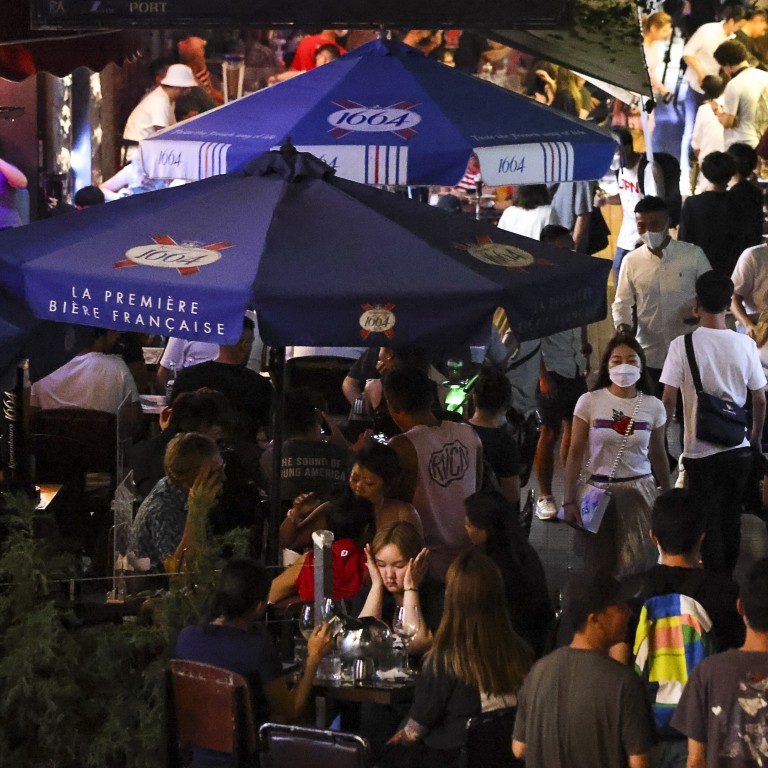
Clubbing in the age of Covid-19: false vaccine records the new fake IDs for Hong Kong’s revellers, while establishments let many enter without proper checks
- Only one out of 10 nightspots visited by Post team followed rules, confirmed vaccination status
- Unbothered by risk of infection, patrons admit using fake vaccine records to get past bouncers
At a bar in Hong Kong’s nightlife hub Lan Kwai Fong, 22-year-old Joanne Li* said she was not vaccinated against Covid-19 but that had not stopped her enjoying an evening out.
She had not been asked to show proof of vaccination to get into her favourite bars, and had been allowed to stay past midnight.
“I think Hong Kong is safe from the coronavirus because there are not many local cases,” said Li, who works in the financial industry and is not vaccinated because she is afraid of possible side effects.
Paul Jones*, 21, an unvaccinated student from Britain, has also been getting into clubs without any trouble.
For the past two weeks, he has been flashing a screenshot of a friend’s vaccination form on his phone to enter clubs, and has yet to be stopped.
“The clubs just want the money,” he said.
Checks by the Post at 10 clubs in Lan Kwai Fong and Tsim Sha Tsui found only one that complied with government rules to inspect patrons’ vaccination records.
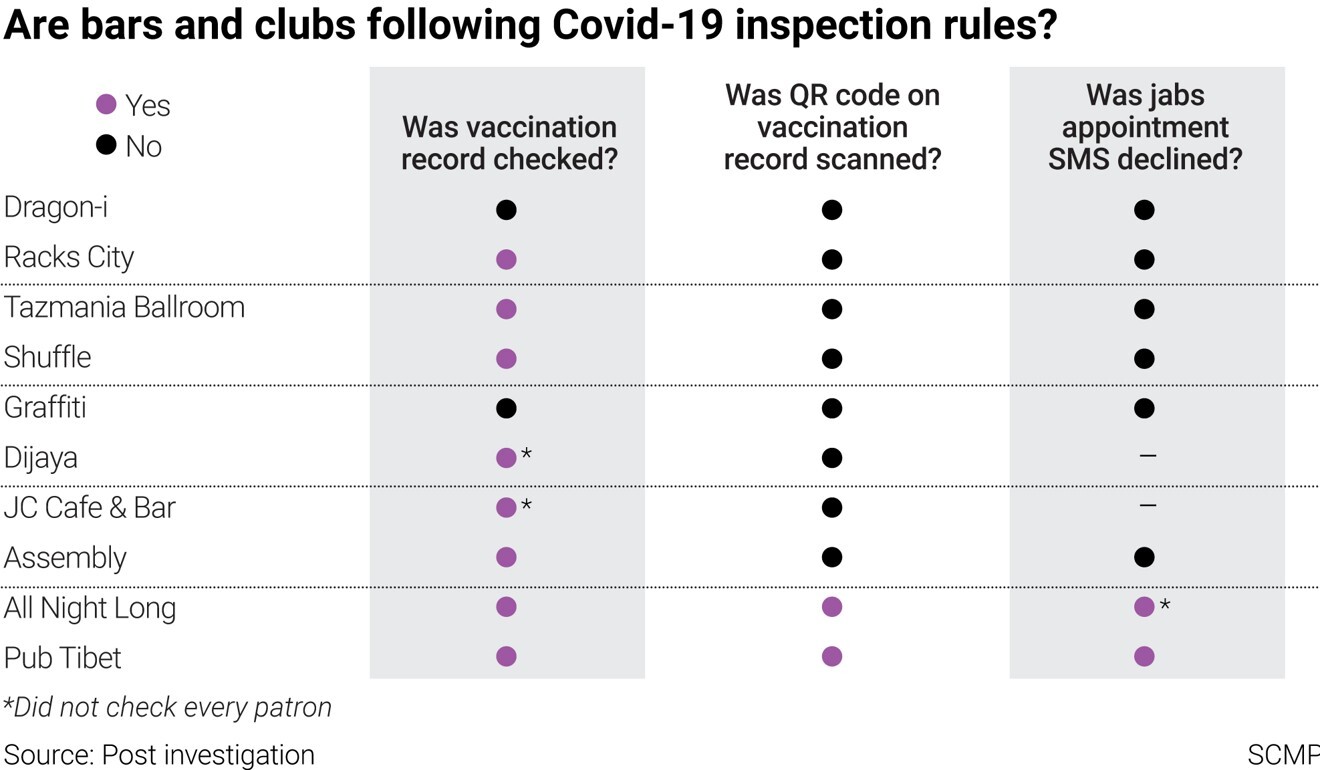
The Post also found patrons who admitted using fake records or knew others who did, and falsified vaccination appointment messages to get past cursory checks.
Our reporters visited five popular bars and nightclubs in Lan Kwai Fong after 10pm on Friday, August 20, and went to five more in Tsim Sha Tsui after midnight on Saturday, August 28.
On the first night, the team went to Dragon-i, Racks City, Tazmania Ballroom, Shuffle and Graffiti, which can accommodate hundreds and are frequented by white-collar workers and celebrities.
University student Zack Cheung*, 21, said he knew of clubbers who used a fake vaccination appointment message on their phone to claim they had their jabs
On August 28, the team was at Dijaya, JC Cafe & Bar, Assembly, All Night Long and Pub Tibet in Tsim Sha Tsui and Knutsford Terrace.
Pub Tibet in Tsim Sha Tsui was the only one that stopped the two reporters when they showed vaccination appointment text messages. Its staff insisted on checking their vaccination records using the government scanning app.
Dragon-i and Graffiti did not ask to see the vaccination records, while Dijaya and JC Cafe & Bar checked the record of only one of the two reporters.
Racks City, Tazmania Ballroom, Shuffle and Assembly waved the reporter through after seeing phone text messages of vaccination bookings.
All Night Long allowed one reporter to enter using the text message, but only after reporter used the “Leave Home Safe” app and had her temperature taken.
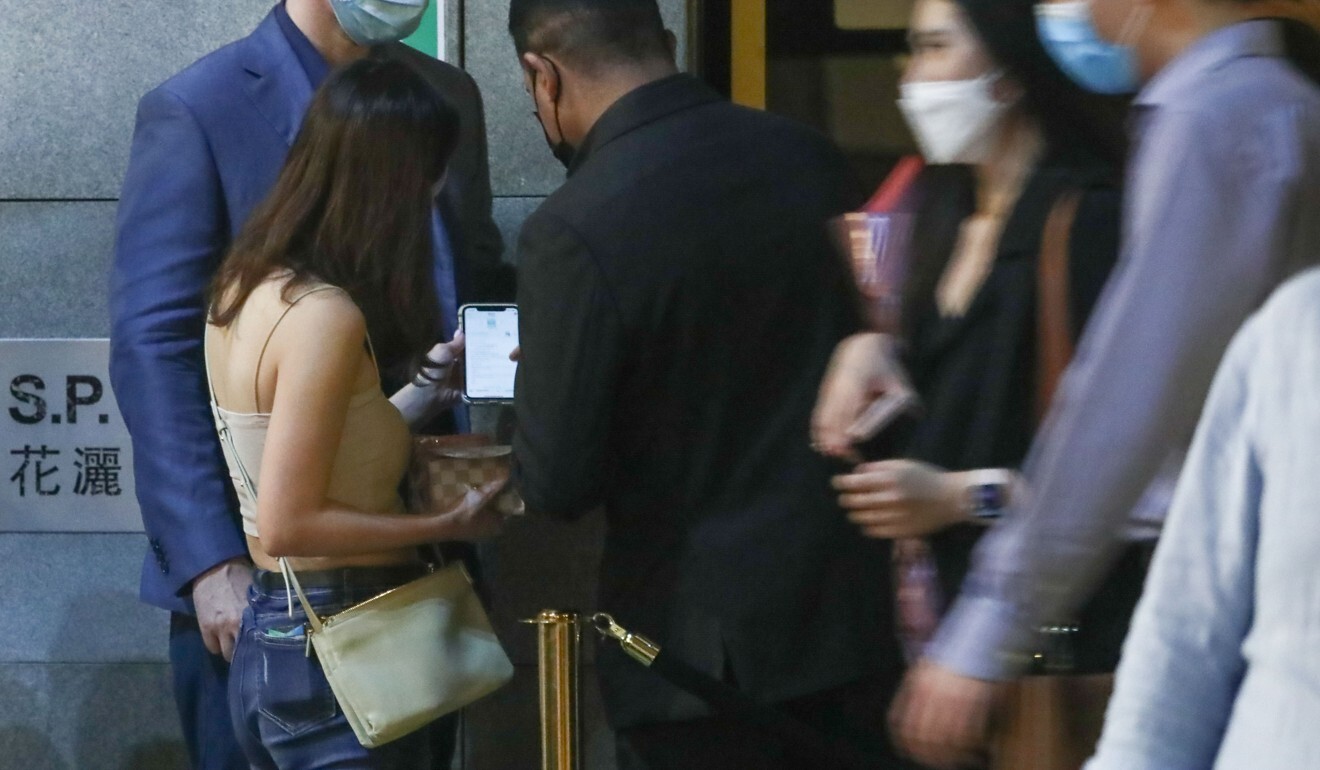
The Post put questions to all the clubs.
Tazmania Ballroom said it had been using phones to scan the QR code of patrons’ vaccination records and checked their names with their identity cards. It did not comment on the Post’s experience.
Racks City said its staff had been told to ask customers for both the Leave Home Safe app and vaccination records, adding that what reporters witnessed was “very much out of character”.
Graffiti declined to comment, and the rest did not respond.
Infectious disease experts warned that although Hong Kong has had only three local Covid-19 infections since June, crowded nightspots were high-risk venues and carelessness there could trigger superspreading events.
Hong Kong parents want vaccination bar lowered as school year begins
Easy to produce a fake record
Bars and clubs reopened in April after being closed for more than four months because of social-distancing restrictions.
They are required to check customers’ vaccination records under the rules of “vaccine bubbles” that allow them to stay open later and serve more people at a table.
Patrons must have received at least one dose of vaccine and use the Leave Home Safe mobile app when they enter the premises.
Some bars in Tsim Sha Tsui operated with restaurant licences under a “vaccine bubble” arrangement which allows them to operate until 2am, if their staff are fully vaccinated and at least two-thirds of customers at the same table have received at least one jab.
Catering businesses have to install and use the government mobile application to check a person’s vaccination status by scanning their QR code. Flouting the rules carries a maximum penalty of a HK$50,000 fine and six months’ jail.
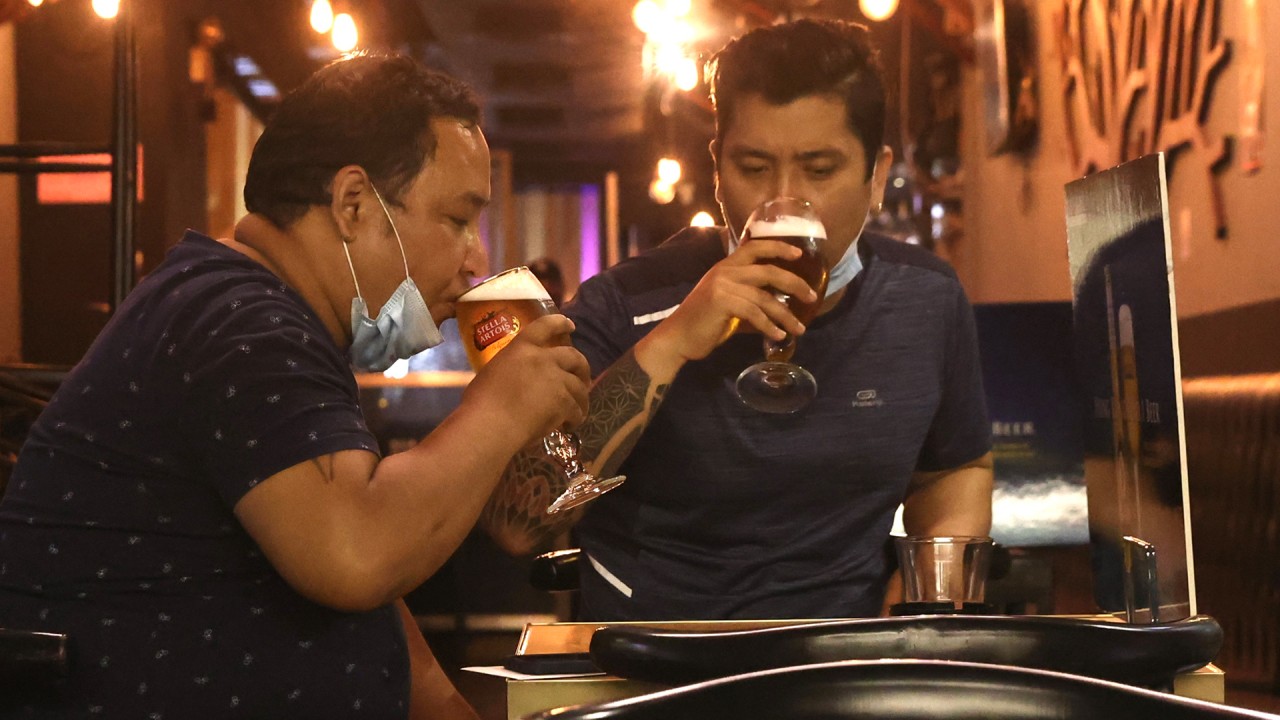
01:52
‘Vaccine bubble’ allowing Hong Kong bars and party rooms to reopen leaves many confused
The Food and Environmental Hygiene Department said that as of Thursday, there had been no reported breach since the rules took effect in April.
Last month, police arrested three people for forging vaccination records and Covid-19 test results. Preliminary investigations showed the documents were sold to jobseekers without identity cards.
Police said they did not have a detailed breakdown of the number of people fined for providing fake vaccination records at food and drinks establishments.
Reporters not only entered most clubs in the two nightlife areas without proper checks, but also found people willing to describe various ploys to bypass the rules.
Tom Tse*, 23, said he was unvaccinated when bars reopened in April, so he Photoshopped a friend’s vaccination record and inserted his name.
“It was pretty simple,” he said. “My friends who had taken their vaccine realised that as long as you had a photo of the certificate or vaccination you could get in everywhere.”
Police, undercover health inspectors raid screening at district councillor’s office
He used his fake record every Friday and Saturday in June. “It never failed,” he said.
Tse said he was just too lazy to get vaccinated earlier, but had his jabs to start work at a bar. Now he thought it was better for people to be vaccinated “to keep it safe”.
University student Zack Cheung*, 21, said he knew of clubbers who used a fake vaccination appointment message on their phone to claim they had their jabs.
He had seen his friends edit a vaccination appointment message, replacing the details with their names and ID information, and make it appear to have been sent by the government.
Flashing that message was enough to get them into bars.
The appointment message only shows an individual has signed up for the vaccination, but does not confirm they have received the shots.
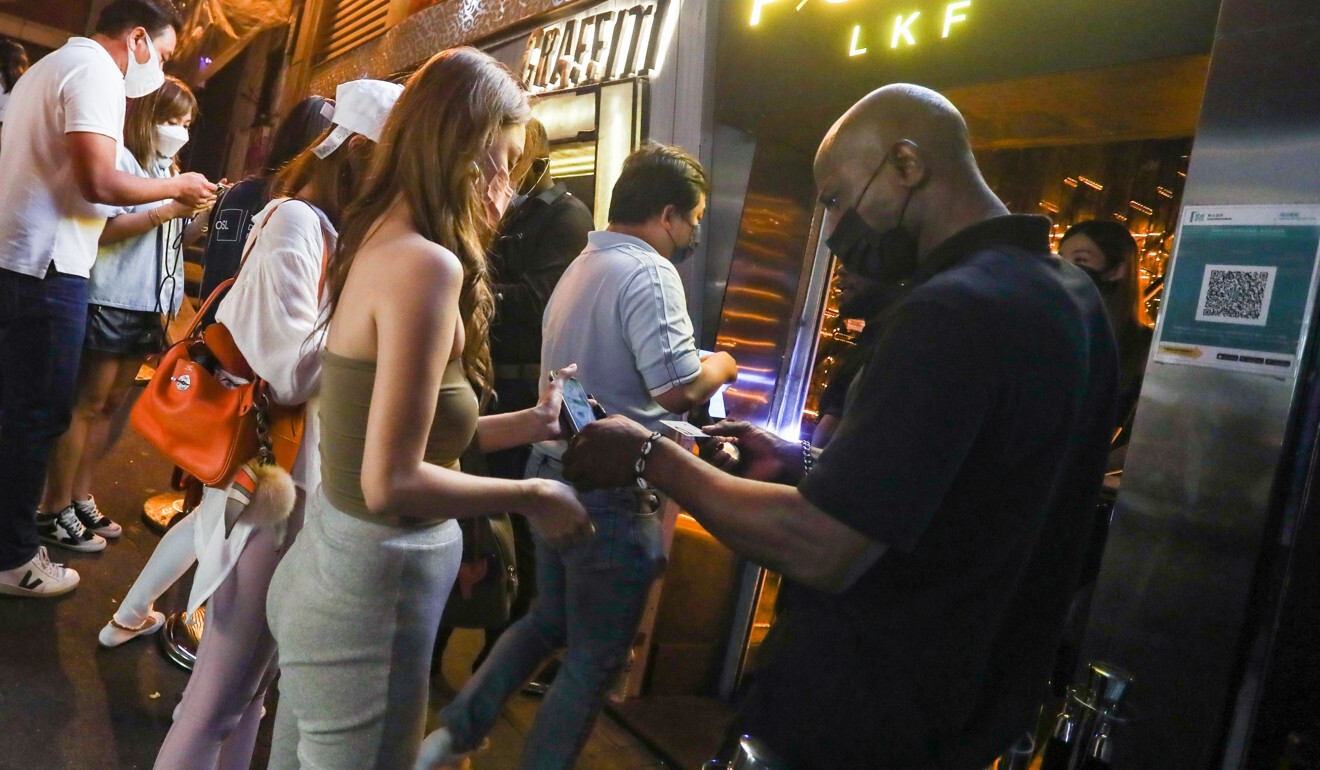
As a check, the QR code provided the best proof of a person’s vaccination record, IT expert Wong Ho-wa said.
It was difficult to replicate the QR code, Wong said, because the technology used had an anti-counterfeiting feature to ensure data was tamper-proof and authentic.
The Lan Kwai Fong Group, which does not own any bars and clubs, but is the biggest landlord in the nightlife district, said it had actively encouraged operators to use the QR code verification scanner, and no falsified records had been spotted so far.
“The operators will follow the regulations strictly, to make the area safe,” a group spokesman said. “We will also cooperate closely with the environmental health department and the police force whenever they carry out any inspection.”
Hong Kong party hub Lan Kwai Fong primed for a comeback, LKF Group CEO says
Anthea Cheung So-may, director of the Lan Kwai Fong Association, which represents businesses in the area, said she had not heard of customers using forged vaccination records.
“In my personal experience, the staff of bars and clubs will scan my vaccination QR code before allowing me to enter the premises at Lan Kwai Fong,” she said.
“Now that the pandemic situation in Hong Kong remains stable, we hope the government can relax some social-distancing measures so that the industry can resume business as soon as possible.”
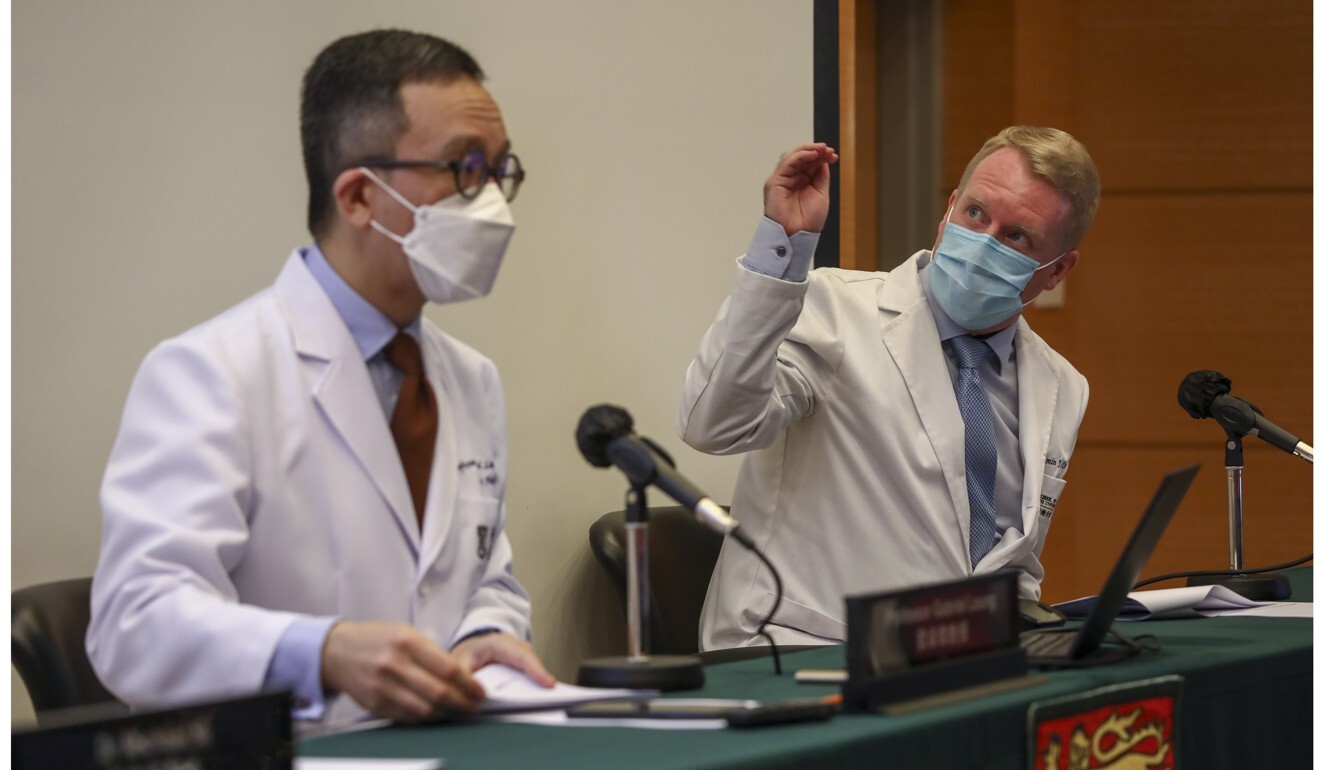
An incentive to get vaccinated
Respiratory specialist Dr Leung Chi-chiu urged authorities to step up inspections at nightspots to avoid superspreading events.
With the Delta variant of the coronavirus, he said even two doses of vaccine might not be enough to prevent infection.
“But having said that, higher risks are posed to unvaccinated people,” he said. “People who forge their vaccination records might tend to violate other social-distancing rules too.”
He added that the size of gatherings at clubs and the culture of barhopping made entertainment venues high-risk places.
Singapore and Taiwan, for example, experienced sudden spikes of infections at karaoke lounges and tea houses respectively.
Hong Kong itself saw more than 700 cases linked to dancing and singing venues late last year, and a nightlife cluster of more than 40 infections in March 2020 involved musicians who performed at bars in Lan Kwai Fong, Wan Chai and Tsim Sha Tsui.
“Once an imported case slips through the net and visits these venues, it will trigger superspreading,” Leung said.
Hong Kong’s zero-Covid plan unsustainable, experts warn
Professor Benjamin Cowling, a leading epidemiologist at the University of Hong Kong, said one of the major advantages of the zero-Covid approach was “the possibility to relax domestic measures”.
If there were no local transmissions, he said, it made little difference whether unvaccinated people went to clubs. But if another community outbreak occurred involving entertainment venues, the clubs would be among the first to be closed.
“Allowing only vaccinated people to enter clubs might be used as an incentive to encourage people to get vaccinated,” he said.
*Names changed at interviewees’ request.


